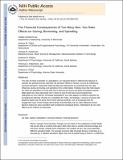| dc.contributor.author | Griskevicius, Vladas | |
| dc.contributor.author | Tybur, Joshua M. | |
| dc.contributor.author | Delton, Andrew W. | |
| dc.contributor.author | Robertson, Theresa E. | |
| dc.contributor.author | White, Andrew E. | |
| dc.contributor.author | Ackerman, Joshua Maxwell | |
| dc.date.accessioned | 2017-07-03T20:05:00Z | |
| dc.date.available | 2017-07-03T20:05:00Z | |
| dc.date.issued | 2017-07-03 | |
| dc.identifier.issn | 1939-1315 | |
| dc.identifier.issn | 0022-3514 | |
| dc.identifier.uri | http://hdl.handle.net/1721.1/110435 | |
| dc.description.abstract | The ratio of males to females in a population is an important factor in determining behavior in animals. We propose that sex ratio also has pervasive effects in humans, such as by influencing economic decisions. Using both historical data and experiments, we examined how sex ratio influences saving, borrowing, and spending in the United States. Findings show that male-biased sex ratios (an abundance of men) lead men to discount the future and desire immediate rewards. Male-biased sex ratios decreased men's desire to save for the future and increased their willingness to incur debt for immediate expenditures. Sex ratio appears to influence behavior by increasing the intensity of same-sex competition for mates. Accordingly, a scarcity of women led people to expect men to spend more money during courtship, such as by paying more for engagement rings. These findings demonstrate experimentally that sex ratio influences human decision making in ways consistent with evolutionary biological theory. Implications for sex ratio effects across cultures are discussed. | en_US |
| dc.language.iso | en_US | |
| dc.publisher | American Psychological Association (APA) | en_US |
| dc.relation.isversionof | http://dx.doi.org/10.1037/a0024761 | en_US |
| dc.rights | Creative Commons Attribution-Noncommercial-Share Alike | en_US |
| dc.rights.uri | http://creativecommons.org/licenses/by-nc-sa/4.0/ | en_US |
| dc.source | PMC | en_US |
| dc.title | The financial consequences of too many men: Sex ratio effects on saving, borrowing, and spending. | en_US |
| dc.type | Article | en_US |
| dc.identifier.citation | Griskevicius, Vladas; Tybur, Joshua M.; Ackerman, Joshua M.; Delton, Andrew W.; Robertson, Theresa E. and White, Andrew E. “The Financial Consequences of Too Many Men: Sex Ratio Effects on Saving, Borrowing, and Spending.” Journal of Personality and Social Psychology 102, 1 (2012): 69–80 © 2011 American Psychological Association (APA) | en_US |
| dc.contributor.department | Sloan School of Management | en_US |
| dc.contributor.mitauthor | Ackerman, Joshua Maxwell | |
| dc.relation.journal | Journal of Personality and Social Psychology | en_US |
| dc.eprint.version | Author's final manuscript | en_US |
| dc.type.uri | http://purl.org/eprint/type/JournalArticle | en_US |
| eprint.status | http://purl.org/eprint/status/PeerReviewed | en_US |
| dspace.orderedauthors | Griskevicius, Vladas; Tybur, Joshua M.; Ackerman, Joshua M.; Delton, Andrew W.; Robertson, Theresa E.; White, Andrew E. | en_US |
| dspace.embargo.terms | N | en_US |
| mit.license | OPEN_ACCESS_POLICY | en_US |
| mit.metadata.status | Complete | |
